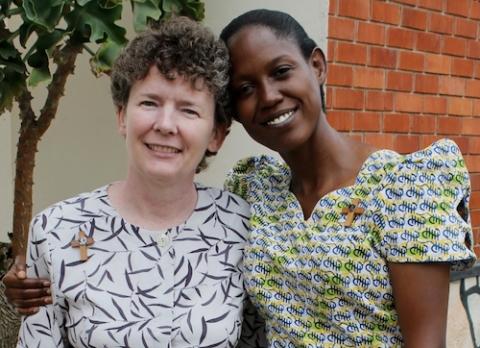
Brass Ghanan gold weight in the form of a "sankofa" bird, representing the proverb of looking to the past to move forward, circa 1600-1850 (Brooklyn Museum)
While I was living in Ghana, I discovered the rich world of symbol in that country's history and culture. One of the Ghanaian symbols that spoke to me deeply was the sankofa, a word meaning literally, "Go back and get it." The sankofa (pronounced SAN-koh-fah) symbol is a bird with an egg held gently in its beak. The bird's feet and body are facing forward, while its head is turned, looking backward. The symbol is one that encourages us to look back and examine our past and to carry forward those treasures that will help us in building our future.
Last week, I finished three years in the presidency of the Leadership Conference of Women Religious (LCWR). The experience of serving in the LCWR presidency has been the gift of a lifetime. I feel a bit like a living sankofa bird as I stand with my feet planted forward, looking back on the many lessons learned. In sifting through those treasures that I carry forward, I was struck anew not only by how much LCWR has given to me, but how much it has to offer our world.
My first lesson is perhaps the most treasured of the many treasures from my time in LCWR leadership. "Listen, and when you think you have heard, pause, and listen again." LCWR members have committed time and energy in recent years to developing the practice of contemplative dialogue. In contemplative dialogue, group members share slowly, listening carefully, avoiding judgment and taking time to pause and consider what each has said. Contemplative dialogue moves us into a deeper space and leads us to listen well. It enables us to truly hear one another, to discern the movement of the Spirit, and to coalesce around a course of action.
Any number of times over my past three years in LCWR leadership, I experienced this when we dealt with a challenging issue: We would listen to various voices and then pause in silence to consider what we had heard. Sometimes, we made a decision in that moment. Sometimes, we took time to think and pray and then returned to the discussion later in the agenda. Always, a direction would emerge in that dance between speaking, listening and silence.
The second lesson might seem at first glance to be the antithesis of the first, but in reality it simply follows from listening and listening again. Put in modern day parlance, it is this. "You need to unmute yourself." Through careful and deep listening, LCWR leadership discerns when it is time to lift its voice in public places. Just as it sometimes takes colleagues on our Zoom call to remind us that we need to unmute ourselves, we all (including LCWR) sometimes need to be reminded when it is time to use our moral authority. We have seen society unmuting itself in recent weeks as hundreds of thousands across the country listened, heard the cry, "I can't breathe," and raised their voices in a righteous cause. As we move forward, it will be critical to continue to remind one another to unmute ourselves in the face of injustice and manipulation of power.
Advertisement
The third lesson follows from that: "Do the hard stuff." Do the stuff that requires risk and vulnerability. When confronted with the need to take an action that you know will give you some sleepless nights and some difficult days, do it. Do it because it's the right thing to do, and because integrity matters and because it's what the Gospel calls you to.
When I first began practicing immigration law, a mentor warned me against accepting only the easy cases. She spoke of the temptation to take on only those cases you know you can win. Those cases give us easy days and grateful clients and the satisfaction of success, she told me, but the clients who really need our help are those with the cases almost impossible to win. This wise woman was telling me what I would later learn anew from my LCWR experience. Do the hard stuff, because it's the stuff that's most worth doing.
It's easy to respond in kind when attacked. It's hard to stand in your own truth and integrity, remain in dialogue, and attempt to understand the other. It's easy to hold your tongue and stay quiet when you know your words will not be welcome. It's hard to speak your truth anyway, and to continue to speak, hoping and trusting you will be heard. It's easy to rest in the way things are and float calmly along, maintaining the status quo. It's hard to work toward transformation, to keep looking to the future, to discern together where the Spirit is calling and to set out on new and untried paths.
The courage to walk those new paths brings me to the last of the life lessons I carry forward: "Commit to the journey." I liken this lesson to one of my favorite metaphors, that of a roller coaster ride. Here's the thing about roller coasters. You don't have to get on the ride. You, the rider, make a choice to get in the line and you can always get back out, right up to that moment when you're stepping into the seat. But once you've made your decision and you're strapped in and the car is moving, commit fully and enjoy the ride. Lean into the curves and throw yourself into those heart-stopping drops. Hold nothing back. It's the only way to ride a roller coaster.

Holy Cross Srs. Sharlet Ann Wagner, left, and Lillian Nyakaisiki in Entebbe, Uganda. (Provided photo)
Fully committed and holding nothing back is also the only way to live any of the major decisions we make in life. LCWR is an organization that does its best to live its organizational life fully committed and holding nothing back. Perhaps this is because it is made up of members who choose this way of living their commitment. Women religious differ from each other in the clothes we wear, the daily schedules we follow, the prayer styles we use. We differ in our perspectives on church and politics and the issues of the day. But our commonalities run deep and strong, and among those commonalities is a way of life that calls us to live our commitment fully and passionately throughout our lives. Women religious share a call that keeps us getting up, walking forward, and trusting in the goodness of God and God's designs even when we cannot discern the pattern.
LCWR's mission is to assist its members in carrying out their own service of leadership in their congregations of women religious. Yet the lessons it teaches and the example it provides are truly treasures that can serve as lessons for all walks of life. May we each activate our inner sankofa, look back to examine our experiences, and carry forward the treasures that will help us build a better future.
[Holy Cross Sr. Sharlet Wagner was president of the Leadership Conference of Women Religious in 2019. From 2014, she served as her congregation's first councilor, and before that served on Holy Cross' leadership team as general secretary. Wagner has a bachelor's degree in journalism from the University of Texas at Austin and a law degree from Loyola Law School in Los Angeles, which led to her main ministry work as an immigration attorney.]




